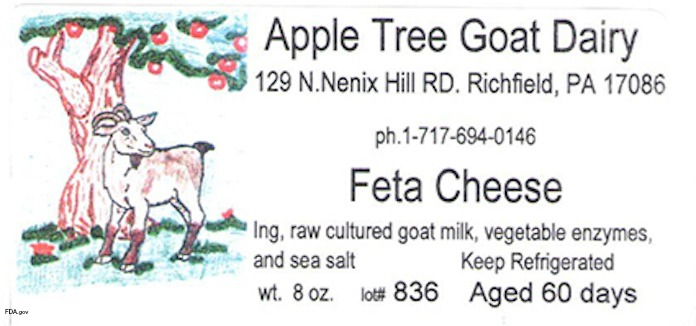The FDA has issued a consumer advisory for possible Listeria monocytogenes contamination in goat cheese products made by Apple Tree Goat Dairy of Richfield, Pennsylvania. Four lots of these products made in March and July 2016 were recalled by the dairy on September 20, 2016. A recent FDA inspection of the facility found the pathogenic bacteria in the firm’s finished products and in the production environment.

No illnesses have been reported to date in connection with the consumption of these products. But listeriosis, the illness caused by this bacteria, can take up to 70 days to appear.
On September 12, 2016, the FDA inspected the Apple Tree facility. Inspectors found poor sanitation practices and also found Listeria monocytogenes bacteria in 18 environmental samples from the processing, packaging, and storage areas. Listeria was found on a cheese slicer, cheese mold, tables, and plates used to hold cheese before packaging. In addition, two of the finished goat cheeses tested positive for Listeria monocytogenes.
After the September 20, 2016 voluntary recall, Apple Tree expanded the real to include all of its goat cheese. But the FDA is not aware of any public notification to consumers announcing this expanded recall. The products were sold in Pennsylvania, Washington, D.C., Maryland, Virginia, and New Jersey through Lancaster Farm Fresh Cooperative, West End Farmers Market in Alexandria, Virginia; Ambler (Pennsylvania) Farmers Market; and Doylestown (Pennsylvania) Farmers Market.
If you purchased these products, throw them away in a sealed or double bagged package so other people and animals can’t access them. Wash your hands after handling the products. And clean out your refrigerator or freezer or wherever the cheeses were stored with a mild bleach solution. Listeria can survive freezing and can grow at refrigerator temperatures.
The symptoms of listeriosis include fever, muscle aches, severe headache, diarrhea, nausea, and vomiting. Pregnant women who contract this illness can suffer miscarriage, premature labor and stillbirth, even though they may only have a mild, flu-like illness. If you ate this cheese and have experienced these symptoms, see your doctor immediately. Some obstetricians will give pregnant women who are potentially exposed to this pathogenic bacteria a course of antibiotics just to prevent these serious problems.




